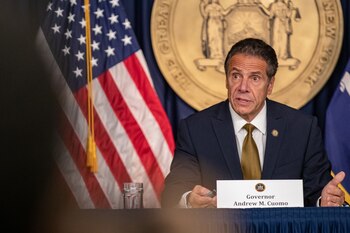
(Bloomberg) -- New York is set to become the most-populous state yet to allow mobile sports betting under a plan proposed Wednesday by Governor Andrew Cuomo.
The governor, who faces a $16 billion budget gap related to the coronavirus, said he would seek an operator or platform to offer mobile sports wagering in the state. He’ll make his proposals as part of his 2021 State of the State address next week.
The U.S. sports-betting market has surged since the U.S. Supreme Court allowed states outside of Nevada to offer such wagers in 2018. Since then, 19 states have begun to offer sports betting and six more have approved it but have yet to put it into operation, according to the American Gaming Association, an industry trade group.
The market is expected to explode to as much as $10 billion by 2025 from about $1.6 billion last year, according to the consulting firm Vixio GamblingCompliance. Operators can make even more money by offering casino-like games online, although that doesn’t appear to be part of the New York proposal.
Not all details have been made public. Cuomo said he’s looking to select a single platform to partner with one of the state’s existing casinos. His plan sets off a horse race between technology providers like Scientific Games Corp. and International Game Technology Plc looking to compete for the license.
State Role
At a news briefing Wednesday, Cuomo said he’d like the system to be run similar to the state lottery to maximize government revenue. Cuomo, who in the past has pushed back on proposals to legalize online sports betting, noted that the state has been losing betting revenue to neighboring New Jersey, which has become a leader in the industry.
“Many states have done sports betting, but they basically allow casinos to run their own gambling operations,” Cuomo said. “That makes a lot of money for casinos, but it makes minimal money for the state.”
State Budget Director Robert Mujica said at the briefing that New York would only make about $50 million annually if it went through casinos, but an estimated $500 million under Cuomo’s proposal.
Model States
Three states -- Oregon, New Hampshire and Rhode Island -- currently run sports wagering through their lotteries, Deutsche Bank analyst Carlo Santarelli said in a research note Wednesday.
New York could look to Rhode Island as a model where sports betting is operated by the lottery in partnership with IGT and William Hill, Morgan Stanley analyst Thomas Allen wrote.
Massachusetts Governor Charlie Baker attempted to legalize sports betting, but failed to convince lawmakers to pass a bill before the legislative session closed early Wednesday.
Under Cuomo’s plan, the New York State Gaming Commission would issue a request for proposals to select an operator. The commission would require any entity operating mobile wagering apps include safeguards against abuses and addiction.
While the market’s initial reaction to Cuomo’s announcement was positive, the proposed structure could limit the opportunity for online casino operators, said Will Hershey, creator of the Roundhill Sports Betting & iGaming ETF. Shares of the fund rose as much as 4.4% intraday before giving back about half of their gain. DraftKings Inc. and Penn National Gaming Inc. fell to session lows following the official announcement.
“In that scenario, it’s hard to see this as a positive for private operators,” Hershey said.
(Updates with investor comments in second-to-last paragraph)
©2021 Bloomberg L.P.
Últimas Noticias
Debanhi Escobar: they secured the motel where she was found lifeless in a cistern
Members of the Specialized Prosecutor's Office in Nuevo León secured the Nueva Castilla Motel as part of the investigations into the case

The oldest person in the world died at the age of 119
Kane Tanaka lived in Japan. She was born six months earlier than George Orwell, the same year that the Wright brothers first flew, and Marie Curie became the first woman to win a Nobel Prize

Macabre find in CDMX: they left a body bagged and tied in a taxi
The body was left in the back seats of the car. It was covered with black bags and tied with industrial tape
The eagles of America will face Manchester City in a duel of legends. Here are the details
The top Mexican football champion will play a match with Pep Guardiola's squad in the Lone Star Cup

Why is it good to bring dogs out to know the world when they are puppies
A so-called protection against the spread of diseases threatens the integral development of dogs




